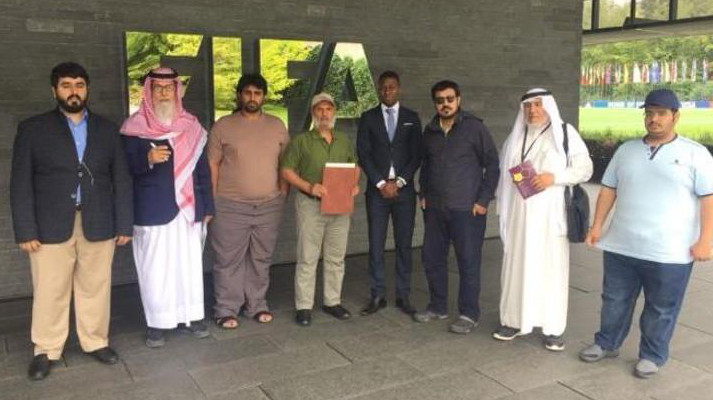Last month, the exiled Qatari al-Ghufran tribe attended the 39th session of the United Nations (UN) Human Rights Council (HRC) to seek international assistance in regards to their banishment from Qatar. They alleged that Qatar is building the 2022 World Cup stadiums on land taken from the tribe. Towards the end of the Council, the al-Ghufran clan also delivered a letter to the Fédération Internationale de Football Association (FIFA), notifying the organization of these allegations and calling for Qatar to be stripped of the 2022 World Cup.
The al-Ghufran clan is part of the larger al-Murrah tribe and were traditionally nomadic before they settled in countries like Saudi Arabia and Qatar. In 1996, Sheikh Khalifa Al Thani attempted to overthrow his son and the Emir of Qatar at the time, Sheikh Hamad bin Khalifa Al Thani. When the coup failed, Sheikh Hamad punished his father’s supporters – including the al-Ghufran tribe. Those directly involved in the attempted coup were arrested and tortured. In 2004, Qatar revoked the citizenship of 5,266 al-Ghufran members and demanded that the tribe leave the country. Now nearly 6,000 al-Ghufran are stateless and demanding justice as Qatar continues construction on numerous stadiums built on the lands it once forced the al-Ghufran to leave.
As the al-Ghufran remain stateless, they have appealed to the international community on some of the most prominent international governing and sporting stages. The complaint they lodged with FIFA emphasized their frustration with Qatar using their land to build the World Cup stadiums, and even touched on other rights abuses such as the mistreatment of World Cup workers. As an international organization, FIFA is expected to hold its hosting countries to UN standards, but Qatar has not been held accountable for its failure to meet them. In light of this, the al-Ghufran’s complaint listed six demands in an effort to hold the state accountable: that Qatar be stripped of hosting the 2022 World Cup, that citizenship is reinstated to the al-Ghufran tribe, that stolen land is returned to its rightful owners, that if Qatar refuses these demands that FIFA must cease playing in Qatar, that Qatar must employ al-Ghufran members in projects built on their land, and that the al-Ghufran must be able to present FIFA officials with a humanitarian case.
The al-Ghufran also raised their concerns at the HRC, calling on the UN High Commissioner for Human Rights, the Qatari people, and international organizations for help. The delegation of al-Ghufran members reiterated that the problem with the Qatari government is purely humanitarian, not political. In addition, the al-Ghufran clan also demonstrated outside the HRC at the Broken Chair memorial, calling for the international community to stop turning a blind eye to ongoing human rights violations in Qatar.
This is not the first time criticism of Qatar’s 2022 World Cup bid has surfaced, nor the first call for attention to human rights violations. The World Cup stadium construction companies have been accused of underpaying their workers or paying wages out late, leaving workers struggling to make ends meet. Additionally, the working environment is dangerous and workers’ camp conditions fail to meet the standards of both Qatari law and FIFA regulations.
Qatar’s road to the 2022 World Cup has been riddled with human rights violations and continuous calls for the bid to be switched. With this new complaint on the use of the al-Ghufran land for construction, it is time that FIFA or the UN look into a serious investigation of ongoing abuses in the Gulf state. FIFA must take seriously the accounts and requests of the al-Ghufran. The al-Ghufran clan deserves their citizenship to be reinstated, the return of their lands, and compensation for their struggles. If FIFA follows these demands, it will be a fundamental step in holding Qatar not only for the harm against the al-Ghufran, but for its broader human rights violations surrounding the event.
Caroline Hickey is an Advocacy intern at ADHRB.





